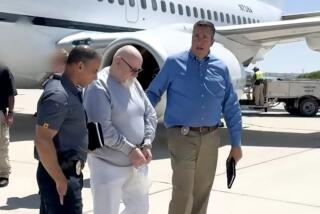Juror Names, Addresses Uncovered in Killer’s Cell : Justice: A private investigator gave information to the inmate and made phone calls for him. A judge says such actions could put the jury system at risk.
A court-ordered search of a convicted murderer’s cell Thursday night turned up a list of names and addresses of jurors who deliberated his case, prompting a San Fernando Superior Court judge to suggest that the situation could have “put the entire jury system at risk.”
Judge David M. Schacter said Friday that obtaining the list was not illegal. However, he said private investigator Lawrence Sanchez should have known better than to give the information to his client, Robert Peernock, who last month was convicted of murdering his wife and soliciting a fellow jail inmate to kill his daughter.
Sanchez had been calling jurors, including at least three with unlisted phone numbers, Monday and Tuesday. Complaints from those jurors prompted the search of Peernock’s cell.
Schacter said he would recommend that Sanchez be removed from a list of investigators eligible for court-appointed work.
He also said he believes state legislation is needed to make it a felony for anyone to contact jurors outside the courthouse after a criminal case has been decided without the approval of the court so that “hindsight is not done at a grave site.”
“We don’t know what Mr. Peernock may or may not have done with the list,” Schacter said. “This may not have been a violation, but it is unconscionable and put everyone in danger. It put the jurors at risk, it put the entire jury system at risk.”
A three-page list with jurors’ names, addresses, dates of birth and occupations was found during a three-hour search of Peernock’s cell Thursday night. The jurors’ phone numbers were not on the list.
Deputy Dist. Atty. Craig Richman, who prosecuted the case, said in court Thursday that Peernock had hired Sanchez to contact jurors and that he feared that Peernock was attempting to locate them to harass or harm them. Schacter ordered a search of Peernock’s cell, and ordered Sanchez to appear in court to explain how he got the unlisted phone numbers of at least three jurors.
Richman said Sanchez had not used the court system to obtain the unlisted phone numbers and suggested that Sanchez got them illegally.
But in court Friday, Sanchez denied any wrongdoing and said he obtained the names of the jurors from court records and the phone numbers through voter registration records.
Sanchez also said he was hired by Peernock to poll the jurors for a possible new trial, and gave the list to Peernock because Peernock was acting as his own attorney. Sanchez said he had reached four of the jurors.
The identities of jurors in criminal cases are not secret. Their names and generally some personal information is revealed about them in court during jury selection. Authorities became concerned in this case, however, because Peernock’s crimes included trying to make arrangements from his jail cell to harm people.
Sanchez said he will fight any attempt to have him removed from the list of investigators eligible for court-appointed work, saying the appointments account for about 90% of his work.
Outside the courtroom, Richman said Sanchez’s actions were improper and that he should not be given any more court-appointed work.
“It was not contempt of court, but it was contemptuous,” Richman said.
Jury Supervisor Patricia Welch said that she had reached 11 of the 12 jurors, calling them to find out if they had been contacted by Sanchez and to remind them that they did not have to talk to him if they chose not to. She said some jurors expressed concern for their safety, and she quoted one saying, “This man is not someone you should be messing around with.”
Peernock, 54, is awaiting sentencing for the July, 1987, murder of his wife, which he attempted to cover up in a staged car crash, and for soliciting from his jail cell the murder of his then 18-year-old daughter and her attorney.
Peernock was convicted of killing his wife, Claire, and attempting to kill his daughter, Natasha Peernock Sims, to gain control of community property and life insurance benefits of more than $1.5 million. Peernock, who was within weeks of finalizing his divorce from Claire, would have realized less than $300,000 in the settlement.
Peernock was scheduled to be sentenced Wednesday to a mandatory term of life in prison, but Judge Howard J. Schwab postponed his decision until Nov. 18 because an Orange County judge has yet to rule on a motion filed by Peernock arguing that Schwab should be removed from the case because he is prejudiced.
Peernock accused Schwab of conspiring with others involved in the case to convict him so that they can gain access to his finances.
More to Read
Sign up for Essential California
The most important California stories and recommendations in your inbox every morning.
You may occasionally receive promotional content from the Los Angeles Times.










